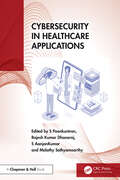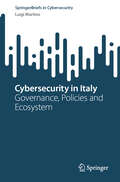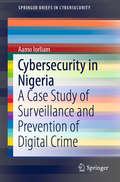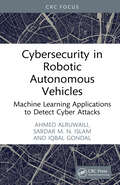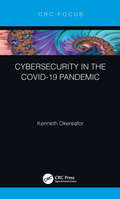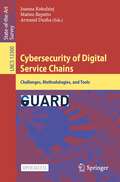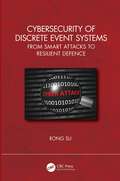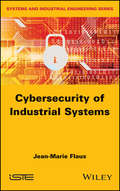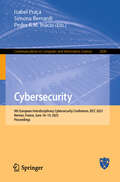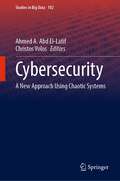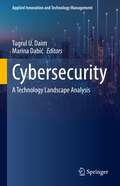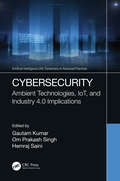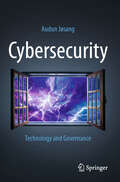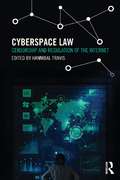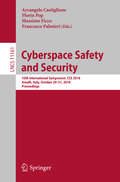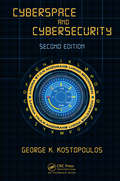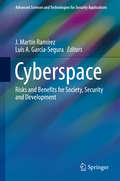- Table View
- List View
Cybersecurity for Smart Cities: Practices and Challenges (Advanced Sciences and Technologies for Security Applications)
by Mohiuddin Ahmed Paul Haskell-DowlandEnsuring cybersecurity for smart cities is crucial for a sustainable cyber ecosystem. Given the undeniable complexity of smart cities, fundamental issues such as device configurations and software updates should be addressed when it is most needed to fight cyber-crime and ensure data privacy. This book addresses the cybersecurity challenges associated with smart cities, aiming to provide a bigger picture of the concepts, intelligent techniques, practices and research directions in this area. Furthermore, this book serves as a single source of reference for acquiring knowledge on the technology, processes and people involved in the next-generation of cyber-smart cities.
Cybersecurity for Space: A Guide to Foundations and Challenges
by Jacob G. OakleySpace is one of the fastest growing military, government and industry sectors. Because everything in today’s world exists within or connected to cyberspace, there is a dire need to ensure cybersecurity is addressed in the burgeoning field of space operations. This revised and expanded edition will prime the reader with the knowledge needed to understand the unique challenges to space operations which affect the implementation of cybersecurity. Further, the reader will have foundational knowledge on what impacts cyber threats can have on space systems and how cybersecurity must rise to meet them. The author, who spent years in the United States Marine Corps, originally involved in satellite communications is now a seasoned cyber security practitioner who has provided cyber security vision and strategy to a large portfolio of systems and programs, many focused specifically in space. A published academic and experienced professional, he brings a practical, real-world and tempered approach to securing the final frontier. What You Will Learn Basic concepts of how different space vehicles operate in general. How such systems and their components integrate into cyberspace. A clear picture of the potential damage available via cyber-attacks to such systems. Basic efforts to mitigate such cyber threats will be presented through the various portions of space operations. Foundational issues at the intersection of the space and cyber domains Who This Book Is For This book is written for anyone curious about warfare in the era of cyber everything, those involved in cyber operations and cyber warfare, as well as security practitioners and policy or decision makers who are on the sending or receiving end of such activity.
Cybersecurity for Space: Protecting the Final Frontier
by Jacob G. OakleyThis is the first book of its kind to cover the unique challenges of creating, maintaining, and operating a system that operates in both outer space and cyber space. It covers the impact that cyber threats can have on space systems and how the cybersecurity industry must rise to meet the threats. Space is one of the fastest growing military, government, and industry sectors. Because everything in today’s world exists within or connected to cyberspace, there is a dire need to ensure that cybersecurity is addressed in the burgeoning field of space operations. You will be introduced to the basic concepts involved in operating space systems that include low earth orbit (LEO), geosynchronous orbit (GEO), and others. Using the related high-level constraints, threats, and vectors, you will be able to frame a clear picture of the need and challenges of bringing cybersecurity to bear on satellites, space vehicles, and their related systems. The author, who has spent seven years in the US Marine Corps and was originally involved in satellite communications and later cyber operations, is now a seasoned cybersecurity practitioner currently implementing cybersecurity vision and strategy to a large portfolio of systems and programs, many focused specifically in space. A published academic and experienced professional, he brings a practical, real-world and tempered approach to securing space vehicles and their systems. What You Will Learn Understand what constitutes a space system and the challenges unique to operations of all spacecraftGet introduced to various space vehicles and their unique constraints and challengesBe aware of the physical and cyber threats to the space vehicle and its ability to fly and orbitKnow the physical and cyber vectors from which threats may manifestStudy the micro- and macro-analysis provided of space system attack scenariosBe familiar with the high-level problems of cybersecurity in the space domain Who This Book Is For This book is written for two audiences: those with a background in space operations as well as those in cybersecurity. It offers the guidance needed to understand the unique challenges to space operations that affect the implementation of cybersecurity.
Cybersecurity in China: The New Wave (Springerbriefs In Cybersecurity Ser.)
by Greg AustinThis book offers the first benchmarking study of China’s response to the problems of security in cyber space. There are several useful descriptive books on cyber security policy in China published between 2010 and 2016. As a result, we know quite well the system for managing cyber security in China, and the history of policy responses. What we don’t know so well, and where this book is useful, is how capable China has become in this domain relative to the rest of the world. This book is a health check, a report card, on China’s cyber security system in the face of escalating threats from criminal gangs and hostile states. The book also offers an assessment of the effectiveness of China’s efforts. It lays out the major gaps and shortcomings in China’s cyber security policy. It is the first book to base itself around an assessment of China’s cyber industrial complex, concluding that China does not yet have one. As Xi Jinping said in July 2016, the country’s core technologies are dominated by foreigners.
Cybersecurity in France (SpringerBriefs in Cybersecurity)
by Philippe BaumardThis Brief presents the overarching framework in which each nation is developing its own cyber-security policy, and the unique position adopted by France. Modern informational crises have penetrated most societal arenas, from healthcare, politics, economics to the conduct of business and welfare. Witnessing a convergence between information warfare and the use of "fake news", info-destabilization, cognitive warfare and cyberwar, this book brings a unique perspective on modern cyberwarfare campaigns, escalation and de-escalation of cyber-conflicts. As organizations are more and more dependent on information for the continuity and stability of their operations, they also become more vulnerable to cyber-destabilization, either genuine, or deliberate for the purpose of gaining geopolitical advantage, waging wars, conducting intellectual theft and a wide range of crimes. Subsequently, the regulation of cyberspace has grown into an international effort where public, private and sovereign interests often collide. By analyzing the particular case of France national strategy and capabilities, the authors investigate the difficulty of obtaining a global agreement on the regulation of cyber-warfare. A review of the motives for disagreement between parties suggests that the current regulation framework is not adapted to the current technological change in the cybersecurity domain. This book suggests a paradigm shift in handling and anchoring cyber-regulation into a new realm of behavioral and cognitive sciences, and their application to machine learning and cyber-defense.
Cybersecurity in Healthcare Applications
by Rajesh Kumar Dhanaraj S. Poonkuntran S. Aanjankumar Malathy SathyamoothyThe book explores the critical challenge of securing sensitive medical data in the face of rising cyber threats. It examines how artificial intelligence can be leveraged to detect and mitigate cyber threats in healthcare environments. It integrates advanced technologies such as AI security applications, blockchain techniques, cryptanalysis, and 5G security to strengthen the protection of healthcare systems. By offering insights into the latest vulnerability assessment technologies and effective protection strategies, this book serves as an essential resource for professionals and researchers dedicated to enhancing cyber security in the healthcare industry.
Cybersecurity in Italy: Governance, Policies and Ecosystem (SpringerBriefs in Cybersecurity)
by Luigi MartinoThis book presents a detailed and innovative analysis of the governance, policies and ecosystem that define the Italian cybersecurity posture. It explores the complex interplay between technology and policy in shaping national security strategies in the digital era. The author introduces the reader to the critical importance of a policy-driven approach to cyber security, highlighting the challenges and necessary evolution prompted by rapid technological advancements and the expanding relevance of cyberspace. It emphasizes the multifaceted nature of cyber security that extends beyond technological solutions to encompass a broad socio-political analytical framework. The author also illustrates the need for an integrated approach that includes policies development, stakeholder engagement and strategic national objectives. This book delves into the organizational structure and dynamics of Italian national cybersecurity ecosystem, while shedding light on the collaborative interactions among different actors within this complex field. It meticulously outlines the roles and responsibilities of public, private and civil sectors in enhancing Italy’s cyber resilience. Key developments such as the establishment of the National Cybersecurity Agency and the formulation of strategic objectives to safeguard national cyber perimeter are critically examined. This examination not only reflects on the strategies employed but also on the challenges and achievements in fostering a robust cyber security environment able to respond to both current and emerging threats. Through a blend of theoretical insights and practical case studies, supplemented by more than 30 semi-structured interviewees. This book also offers a comprehensive overview of efforts implemented by Italy in 10 years of policy making experience with the aim to structure the appropriate cyber security national institutional architecture. It provides valuable perspectives on the effectiveness of these policies, the ongoing adjustments required to address the fluid nature of cyber threats, and the implications of these efforts on both national and international scales. Upper-under graduate level and graduate level students in computer science or students interested in cybersecurity will want to purchase this book as a study guide. Researchers working in cybersecurity as well as Policy Makers, Legislators, Decision Makers and CISO will also want to purchase this book as a reference book.
Cybersecurity in Nigeria: A Case Study of Surveillance and Prevention of Digital Crime (SpringerBriefs in Cybersecurity)
by Aamo IorliamThis book reviews the use of digital surveillance for detecting, investigating and interpreting fraud associated with critical cyberinfrastructures in Nigeria, as it is well known that the country’s cyberspace and cyberinfrastructures are very porous, leaving too much room for cyber-attackers to freely operate. In 2017, there were 3,500 successful cyber-attacks on Nigerian cyberspace, which led to the country losing an estimated 450 million dollars. These cybercrimes are hampering Nigeria’s digital economy, and also help to explain why many Nigerians remain skeptical about Internet marketing and online transactions. If sensitive conversations using digital devices are not well monitored, Nigeria will be vulnerable to cyber-warfare, and its digital economy, military intelligence, and related sensitive industries will also suffer. The Nigerian Army Cyber Warfare Command was established in 2018 in order to combat terrorism, banditry, and other attacks by criminal groups in Nigeria. However, there remains an urgent need to produce digital surveillance software to help law enforcement agencies in Nigeria to detect and prevent these digitally facilitated crimes. The monitoring of Nigeria’s cyberspace and cyberinfrastructure has become imperative, given that the rate of criminal activities using technology has increased tremendously. In this regard, digital surveillance includes both passive forensic investigations (where an attack has already occurred) and active forensic investigations (real-time investigations that track attackers). In addition to reviewing the latest mobile device forensics, this book covers natural laws (Benford’s Law and Zipf’s Law) for network traffic analysis, mobile forensic tools, and digital surveillance software (e.g., A-BOT). It offers valuable insights into how digital surveillance software can be used to detect and prevent digitally facilitated crimes in Nigeria, and highlights the benefits of adopting digital surveillance software in Nigeria and other countries facing the same issues.
Cybersecurity in Robotic Autonomous Vehicles: Machine Learning Applications to Detect Cyber Attacks
by Ahmed Alruwaili Sardar M. Islam Iqbal GondalCybersecurity in Robotic Autonomous Vehicles introduces a novel intrusion detection system (IDS) specifically designed for AVs, which leverages data prioritisation in CAN IDs to enhance threat detection and mitigation. It offers a pioneering intrusion detection model for AVs that uses machine and deep learning algorithms.Presenting a new method for improving vehicle security, the book demonstrates how the IDS has incorporated machine learning and deep learning frameworks to analyse CAN bus traffic and identify the presence of any malicious activities in real time with high level of accuracy. It provides a comprehensive examination of the cybersecurity risks faced by AVs with a particular emphasis on CAN vulnerabilities and the innovative use of data prioritisation within CAN IDs.The book will interest researchers and advanced undergraduate students taking courses in cybersecurity, automotive engineering, and data science. Automotive industry and robotics professionals focusing on Internet of Vehicles and cybersecurity will also benefit from the contents.
Cybersecurity in the Age of Smart Societies: Proceedings of the 14th International Conference on Global Security, Safety and Sustainability, London, September 2022 (Advanced Sciences and Technologies for Security Applications)
by Hamid JahankhaniThis book provides an opportunity for researchers, scientists, government officials, strategist and operators and maintainers of large, complex and advanced systems and infrastructure to update their knowledge with the state of best practice in the challenging domains whilst networking with the leading representatives, researchers and solution providers. The ongoing pandemic has created a new level of threats which presents new challenges around privacy, data protection, malicious application, unprotected networks or networks with basic protection that are being used as a gateway to larger infrastructure with complicated architecture, and unintentional misuse such as those associated with algorithmic bias. All these have increased the number of attack vectors that can be used to attack such networks. Drawing on 13 years of successful events on information security, digital forensics and cyber-crime, the 14th ICGS3-22 conference aims to provide attendees with an information-packed agenda with representatives from across the industry and the globe. The challenges of complexity, rapid pace of change and risk/opportunity issues associated with modern products, systems, special events and infrastructures. In an era of unprecedented volatile, political and economic environment across the world, computer-based systems face ever more increasing challenges, disputes and responsibilities, and whilst the Internet has created a global platform for the exchange of ideas, goods and services, it has also created boundless opportunities for cyber-crime. This volume presents new materials and contribute to knowledge through the technological advances that are being made across artificial intelligence (AI), machine learning, blockchain and quantum computing. These technologies driven by a digital revolution are expected to be disruptive and provide major digital transformation in the way societies operate today. As result, although these advances provide social and economic benefits, but, also, provide new challenges that security industry need to raise their game to combat them.
Cybersecurity in the COVID-19 Pandemic
by Kenneth OkereaforAs the 2020 global lockdown became a universal strategy to control the COVID-19 pandemic, social distancing triggered a massive reliance on online and cyberspace alternatives and switched the world to the digital economy. Despite their effectiveness for remote work and online interactions, cyberspace alternatives ignited several Cybersecurity challenges. Malicious hackers capitalized on global anxiety and launched cyberattacks against unsuspecting victims. Internet fraudsters exploited human and system vulnerabilities and impacted data integrity, privacy, and digital behaviour. Cybersecurity in the COVID-19 Pandemic demystifies Cybersecurity concepts using real-world cybercrime incidents from the pandemic to illustrate how threat actors perpetrated computer fraud against valuable information assets particularly healthcare, financial, commercial, travel, academic, and social networking data. The book simplifies the socio-technical aspects of Cybersecurity and draws valuable lessons from the impacts COVID-19 cyberattacks exerted on computer networks, online portals, and databases. The book also predicts the fusion of Cybersecurity into Artificial Intelligence and Big Data Analytics, the two emerging domains that will potentially dominate and redefine post-pandemic Cybersecurity research and innovations between 2021 and 2025. The book’s primary audience is individual and corporate cyberspace consumers across all professions intending to update their Cybersecurity knowledge for detecting, preventing, responding to, and recovering from computer crimes. Cybersecurity in the COVID-19 Pandemic is ideal for information officers, data managers, business and risk administrators, technology scholars, Cybersecurity experts and researchers, and information technology practitioners. Readers will draw lessons for protecting their digital assets from email phishing fraud, social engineering scams, malware campaigns, and website hijacks.
Cybersecurity of Digital Service Chains: Challenges, Methodologies, and Tools (Lecture Notes in Computer Science #13300)
by Joanna Kołodziej Matteo Repetto Armend DuzhaThis open access book presents the main scientific results from the H2020 GUARD project. The GUARD project aims at filling the current technological gap between software management paradigms and cybersecurity models, the latter still lacking orchestration and agility to effectively address the dynamicity of the former. This book provides a comprehensive review of the main concepts, architectures, algorithms, and non-technical aspects developed during three years of investigation; the description of the Smart Mobility use case developed at the end of the project gives a practical example of how the GUARD platform and related technologies can be deployed in practical scenarios. We expect the book to be interesting for the broad group of researchers, engineers, and professionals daily experiencing the inadequacy of outdated cybersecurity models for modern computing environments and cyber-physical systems.
Cybersecurity of Discrete Event Systems: From Smart Attacks to Resilient Defence
by Rong SuThis book describes analysis and control against smart cyberattacks in discrete event systems (DES). This is the first technical DES book to provide a thorough introduction to smart cyberattacks on supervisory control systems modelled by regular languages or finite-state automata and possible resilient defence methods against smart cyberattacks."Smart attacks" cannot be detected by the supervisor until an irreversible process toward ensured damage occurs. An attack may be conducted either in the observation channel (i.e., the supervisor’s input of the supervisor) or in the command channel (i.e., the supervisor’s output) or both simultaneously. Therefore, defence strategies against these attacks are urgently needed. Rong Su provides a comprehensive overview of the latest theories and includes empirical examples to illustrate concepts and methods. By centering on what information is available and how such information is used, the readers are provided with methods to evaluate the cyber vulnerability of a given system and design a resilient supervisor against relevant smart attacks. This book comprises two sections. Firstly, Su introduces the required concepts and techniques related to DES and supervisory control. Then he introduces different types of smart attacks that intercept and manipulate information in sensor and command channels in a standard closed-loop control system. Secondly, he presents resilient defence strategies against relevant types of attacks.By focusing on a conceptual introduction and systematic analysis, this book provides a solid theoretical foundation for future exploration by researchers and graduate students who are interested in cybersecurity research, not necessarily limited to those in the DES community. To illustrate the practical relevance of this research, realistic examples are used throughout this book. Readers are recommended to have a background in formal language theory.
Cybersecurity of Industrial Systems
by Jean-Marie FlausHow to manage the cybersecurity of industrial systems is a crucial question. To implement relevant solutions, the industrial manager must have a clear understanding of IT systems, of communication networks and of control-command systems. They must also have some knowledge of the methods used by attackers, of the standards and regulations involved and of the available security solutions. Cybersecurity of Industrial Systems presents these different subjects in order to give an in-depth overview and to help the reader manage the cybersecurity of their installation. The book addresses these issues for both classic SCADA architecture systems and Industrial Internet of Things (IIoT) systems.
Cybersecurity, Privacy and Freedom Protection in the Connected World: Proceedings of the 13th International Conference on Global Security, Safety and Sustainability, London, January 2021 (Advanced Sciences and Technologies for Security Applications)
by Hamid Jahankhani Arshad Jamal Shaun LawsonThis book provides an opportunity for investigators, government officials, systems scientists, strategists, assurance researchers, owners, operators and maintainers of large, complex and advanced systems and infrastructures to update their knowledge with the state of best practice in the challenging domains whilst networking with the leading representatives, researchers and solution providers. Drawing on 12 years of successful events on information security, digital forensics and cyber-crime, the 13th ICGS3-20 conference aims to provide attendees with an information-packed agenda with representatives from across the industry and the globe. The challenges of complexity, rapid pace of change and risk/opportunity issues associated with modern products, systems, special events and infrastructures. In an era of unprecedented volatile, political and economic environment across the world, computer-based systems face ever more increasing challenges, disputes and responsibilities, and whilst the Internet has created a global platform for the exchange of ideas, goods and services, it has also created boundless opportunities for cyber-crime. As an increasing number of large organizations and individuals use the Internet and its satellite mobile technologies, they are increasingly vulnerable to cyber-crime threats. It is therefore paramount that the security industry raises its game to combat these threats. Whilst there is a huge adoption of technology and smart home devices, comparably, there is a rise of threat vector in the abuse of the technology in domestic violence inflicted through IoT too. All these are an issue of global importance as law enforcement agencies all over the world are struggling to cope.
Cybersecurity: 9th European Interdisciplinary Cybersecurity Conference, EICC 2025, Rennes, France, June 18–19, 2025, Proceedings (Communications in Computer and Information Science #2500)
by Simona Bernardi Isabel Praça Pedro R.M. InácioThis book constitutes the proceedings of the 9th European Interdisciplinary Cybersecurity Conference, EICC 2025, which took place in Rennes, France, during June 18–19, 2025. The 21 full papers and 2 short papers included in these proveedings were carefully reviewed and selected from 39 submissions. They were organized in topical sections as follows: Artificial intelligence applied to cybersecurity; cybercrime and cyberthreats; cybersecurity; software development security; advances in interdisciplinary cybersecurity: insights from funded reserach projects - CyFRP 2025 special session; complex network analysis for cybersecurity - CNACYS 2025 special session; medical device security and privacy - MeDSec 2025 special session; MDCG guidance; threshold multiparty private set intersection.
Cybersecurity: A New Approach Using Chaotic Systems (Studies in Big Data #102)
by Christos Volos Ahmed A. Abd El-LatifThis book presents techniques and security challenges of chaotic systems and their use in cybersecurity. It presents the state-of-the-art and the latest discoveries in the field of chaotic systems and methods and proposes new models, practical solutions, and technological advances related to new chaotic dynamical systems. The book can be used as part of the bibliography of the following courses: - Cybersecurity - Cryptography - Networks and Communications Security - Nonlinear Circuits - Nonlinear Systems and Applications
Cybersecurity: A Technology Landscape Analysis (Applied Innovation and Technology Management)
by Tugrul U. Daim Marina DabićCybersecurity has become a critical area to focus after recent hack attacks to key infrastructure and personal systems. This book reviews the building blocks of cybersecurity technologies and demonstrates the application of various technology intelligence methods through big data. Each chapter uses a different mining method to analyze these technologies through different kinds of data such as patents, tweets, publications, presentations, and other sources. It also analyzes cybersecurity methods in sectors such as manufacturing, energy and healthcare.
Cybersecurity: Ambient Technologies, IoT, and Industry 4.0 Implications (Artificial Intelligence (AI): Elementary to Advanced Practices)
by Om Prakash Singh Gautam Kumar Hemraj SainiIt is becoming increasingly important to design and develop adaptive, robust, scalable, reliable, security and privacy mechanisms for IoT applications and for Industry 4.0 related concerns. This book serves as a useful guide for researchers and industry professionals and will help beginners to learn the basics to the more advanced topics. Along with exploring security and privacy issues through the IoT ecosystem and examining its implications to the real-world, this book addresses cryptographic tools and techniques and presents the basic and high-level concepts that can serve as guidance for those in the industry as well as help beginners get a handle on both the basic and advanced aspects of security related issues. The book goes on to cover major challenges, issues, and advances in IoT and discusses data processing as well as applications for solutions, and assists in developing self-adaptive cyberphysical security systems that will help with issues brought about by new technologies within IoT and Industry 4.0. This edited book discusses the evolution of IoT and Industry 4.0 and brings security and privacy related technological tools and techniques onto a single platform so that researchers, industry professionals, graduate, postgraduate students, and academicians can easily understand the security, privacy, challenges and opportunity concepts and make then ready to use for applications in IoT and Industry 4.0.
Cybersecurity: Technology and Governance
by Audun JøsangThis book gives a complete introduction to cybersecurity and its many subdomains. It’s unique by covering both technical and governance aspects of cybersecurity and is easy to read with 150 full color figures. There are also exercises and study cases at the end of each chapter, with additional material on the book's website. The numerous high-profile cyberattacks being reported in the press clearly show that cyberthreats cause serious business risks. For this reason, cybersecurity has become a critical concern for global politics, national security, organizations as well for individual citizens. While cybersecurity has traditionally been a technological discipline, the field has grown so large and complex that proper governance of cybersecurity is needed. The primary audience for this book is advanced level students in computer science focusing on cybersecurity and cyber risk governance. The digital transformation of society also makes cybersecurity relevant in many other disciplines, hence this book is a useful resource for other disciplines, such as law, business management and political science. Additionally, this book is for anyone in the private or public sector, who wants to acquire or update their knowledge about cybersecurity both from a technological and governance perspective.
Cyberspace Law: Censorship and Regulation of the Internet (Routledge Research in Information Technology and E-Commerce Law)
by Hannibal TravisThis book explores what the American Civil Liberties Union calls the "third era" in cyberspace, in which filters "fundamentally alter the architectural structure of the Internet, with significant implications for free speech." Although courts and nongovernmental organizations increasingly insist upon constitutional and other legal guarantees of a freewheeling Internet, multi-national corporations compete to produce tools and strategies for making it more predictable. When Google attempted to improve our access to information containing in books and the World Wide Web, copyright litigation began to tie up the process of making content searchable, and resulted in the wrongful removal of access to thousands if not millions of works. Just as the courts were insisting that using trademarks online to criticize their owners is First Amendment-protected, corporations and trade associations accelerated their development of ways to make Internet companies liable for their users’ infringing words and actions, potentially circumventing free speech rights. And as social networking and content-sharing sites have proliferated, so have the terms of service and content-detecting tools for detecting, flagging, and deleting content that makes one or another corporation or trade association fear for its image or profits. The book provides a legal history of Internet regulation since the mid-1990s, with a particular focus on efforts by patent, trademark, and copyright owners to compel Internet firms to monitor their online offerings and remove or pay for any violations of the rights of others. This book will be of interest to students of law, communications, political science, government and policy, business, and economics, as well as anyone interested in free speech and commerce on the internet.
Cyberspace Safety and Security: 10th International Symposium, CSS 2018, Amalfi, Italy, October 29–31, 2018, Proceedings (Lecture Notes in Computer Science #11161)
by Florin Pop Arcangelo Castiglione Francesco Palmieri Massimo FiccoThis book constitutes the proceedings of the 10th International Symposium on Cyberspace Safety and Security, CSS 2018, held in Amalfi, Italy, in October 2018. The 25 full papers presented in this volume were carefully reviewed and selected from 79 submissions.The papers focus on cybersecurity; cryptography, data security, and biometric techniques; and social security, ontologies, and smart applications.
Cyberspace and Cybersecurity (Second Edition)
by George KostopoulosProviding comprehensive coverage of cyberspace and cyber security, this textbook not only focuses on technologies but also explores human factors and organizational perspectives and emphasizes why asset identification should be the cornerstone of any information security strategy. Topics include addressing vulnerabilities, building a secure enterprise, blocking intrusions, ethical and legal issues, and business continuity. Updates include topics such as cyber risks in mobile telephony, steganography, cyber security as an added value, ransomware defense, review of recent cyber laws, new types of cyber crime, plus new chapters on digital currencies and encryption key management.
Cyberspace, Cyberterrorism and the International Security in the Fourth Industrial Revolution: Threats, Assessment and Responses (Advanced Sciences and Technologies for Security Applications)
by Reza MontasariThis book represents an interdisciplinary academic endeavour intended to provide readers with a comprehensive, balanced, and nuanced examination of critical issues at the intersection of cyberspace, cyberterrorism, and national and international security. It draws insights from a range of diverse fields, including Computer Science, Social Science, Political Science, International Relations, Criminology, and Law. Furthermore, the book investigates the field of Artificial Intelligence (AI) and related technologies, exploring their dual role in this dynamic landscape of contemporary cyberthreats, with both constructive and malicious implications.The book comprises four distinct themes, with each theme represented by a dedicated Part. Within this organisational framework, each overarching theme is systematically explored through a series of chapters, providing readers with a clear and thematic roadmap for their journey through the content.Part I, Understanding Terrorism and Counter-Terrorism Strategies, of the book explores complexities surrounding contemporary global security challenges. It serves as the foundational segment of the book, consisting of three chapters that critically analyse various dimensions of terrorism and the strategies implemented to combat it.Part II, Cyberterrorism Landscape, of the book offers an in-depth assessment of the current cyberterrorism landscape. This section comprises two critical chapters, each contributing to a comprehensive understanding of the contemporary threats posed by cyberterrorism and their implications for national security.Part III, Countering Cyberterrorism with Technology, of the book forms the core of the book’s exploration into leveraging technology to mitigate the threats of cyberterrorism. This section includes four critical chapters, collectively providing an in-depth understanding of the intersection between technology and counterterrorism strategies.Part IV, Artificial Intelligence and National and International Security, of the book delves into the complex relationship between AI technology and the broader security landscape. Comprising three pivotal chapters, this section provides a detailed understanding of AI’s transformative role in shaping the future of national and international security.This comprehensive resource serves as a valuable reference for law enforcement, policymakers, cybersecurity experts, researchers, academics, and technology enthusiasts interested in counter-terrorism efforts. By exploring the intricate landscape of cyberspace, this book equips readers with knowledge essential to addressing the evolving challenges posed by cyber terrorism.This comprehensive resource serves as a valuable reference for law enforcement, policymakers, cybersecurity experts, researchers, academics, and technology enthusiasts interested in counter-terrorism efforts. By exploring the intricate landscape of cyberspace, this book equips readers with knowledge essential to addressing the evolving challenges posed by cyber terrorism.This comprehensive resource serves as a valuable reference for law enforcement, policymakers, cybersecurity experts, researchers, academics, and technology enthusiasts interested in counter-terrorism efforts. By exploring the intricate landscape of cyberspace, this book equips readers with knowledge essential to addressing the evolving challenges posed by cyber terrorism.This comprehensive resource serves as a valuable reference for law enforcement, policymakers, cybersecurity experts, researchers, academics, and technology enthusiasts interested in counter-terrorism efforts. By exploring the intricate landscape of cyberspace, this book equips readers with knowledge essential to addressing the evolving challenges posed by cyber terrorism.This comprehensive resource serves as a valuable reference for law enforcement, policymakers, cybersecurity experts, researchers, academics, and technology enthusiasts interested in counter-terrorism efforts. By exploring the in
Cyberspace: Risks and Benefits for Society, Security and Development (Advanced Sciences and Technologies for Security Applications)
by J. Martín Ramírez Luis A. García-SeguraThis book covers many aspects of cyberspace, emphasizing not only its possible ‘negative’ challenge as a threat to security, but also its positive influence as an efficient tool for defense as well as a welcome new factor for economic and industrial production. Cyberspace is analyzed from quite different and interdisciplinary perspectives, such as: conceptual and legal, military and socio-civil, psychological, commercial, cyber delinquency, cyber intelligence applied to public and private institutions, as well as the nuclear governance.





